January 19 (Eastern Orthodox liturgics)
January 18 - Eastern Orthodox liturgical calendar - January 20
All fixed commemorations below are observed on February 1 by Eastern Orthodox Churches on the Old Calendar.[note 1]
For January 19th, Orthodox Churches on the Old Calendar commemorate the Saints listed on January 6.
Saints
- Virgin-martyr Euphrasia of Nicomedia (303)[1][2][3]
- Saint Theodotus, Bishop of Cyrene (c. 307-323)[4][note 2]
- Venerable Macarius the Great of Egypt (390)[1][5][6]
- Venerable Macarius of Alexandria (c. 394)[1][7][8]
- Venerable Macarius, Bishop of Ierissos, on the Chalkidiki peninsula (c. 395-408)[9]
- Venerable Anthony the Stylite of Martqopi, founder of monasticism in Georgia (6th century)[1][10]
- Martyr Anthony Rawah the Qoraisite (797)[1]
- Saint Arsenius of Kerkyra, Archbishop of Corfu (953)[1][11][12]
Pre-Schism Western saints
- Martyr Pontian, in Spoleto, Italy under Marcus Aurelius (169)[13][note 3]
- Virgin-martyr Messalina, in Foligno, Italy (251)[13][note 4]
- Martyrs Maris, Martha, Abachum and Audifax, in Rome (270)[13][note 5][note 6] (see also: July 6)
- Martyrs Paul, Gerontius, Januarius, Saturninus, Saccesius, Julius, Catius, Pius and Germanus, in Numidia in North Africa.[13][14][15]
- Saint Firminus, third Bishop of Gévaudan (Gabales) in France.[13]
- Saint Bassian of Lodi, Bishop of Lodi in Lombardy (413)[13][note 7]
- Saint Contestus (Contentius), Bishop of Bayeux in France from 480 on (510)[13]
- Saint Laumer (Lomer, Laudomarus), Abbot of Corbion Monastery (593)[13][note 8]
- Saint Branwalader (Breward) of Cornwall, Bishop in Jersey in the Channel Islands. (6th century)[1][13][note 9]
- Saint Nathalan (Nachlan, Nauchlan), Bishop of Tullicht, in Aberdeenshire, Scotland (678)[13][note 10]
- Saint Remigius of Rouen, Bishop of Rouen in France from 755 onwards (772)[13]
- Saint Arcontius, Bishop of Viviers in France, killed by a mob for having upheld the rights of the Church (c. 8th century)[13]
- Saint Catellus (Castellus), Bishop of Castellamare to the south of Naples in Italy (9th century)[13]
Post-Schism Orthodox saints
- Venerable Cosmas, of the Monastery of St. John Chrysostom, at Koutsovendis, Cyprus.[17]
- Venerable Macarius the Faster, of the Kiev Caves (12th century)[1][18][19]
- Venerable Meletius the Galesiote, Confessor of Mount Galesion, monk (1283)[1][20]
- Venerable Macarius, Deacon of the Kiev Caves, Wonderworker (13th-14th century)[1][21][22]
- Blessed Theodore of Novgorod, Fool-for-Christ (1392)[1][23][24]
- Saint Mark Evgenikos of Ephesus, Archbishop of Ephesus, who resisted the Roman Catholic heresies (1444)[1][25][26][27]
- Saint Macarius the Roman of Novgorod, Abbot (1550)[1][28][29]
Other commemorations
- Commemoration of the miracle wrought by St. Basil the Great at Nicaea, when by his prayer he opened the gates of the Universal (Catholic) church and entrusted it to the Orthodox.[32]
- Translation of the relics (950) of Saint Gregory the Theologian (389)[1][30][33]
- Opening of the relics (1652) of Saint Sabbas of Storozhev in Zvenigorod (1406)[1][30][34]
- Repose of Schemanun Anatolia of Diveyevo (1949)[1]
Icon gallery
.jpg.webp) Virgin-martyr Euphrasia of Nicomedia
Virgin-martyr Euphrasia of Nicomedia
(Menologion of Basil II)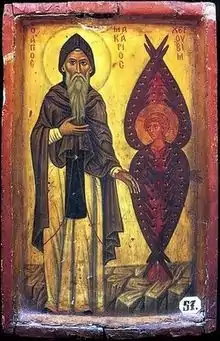 Venerable Macarius the Great of Egypt and the Cherubim.
Venerable Macarius the Great of Egypt and the Cherubim.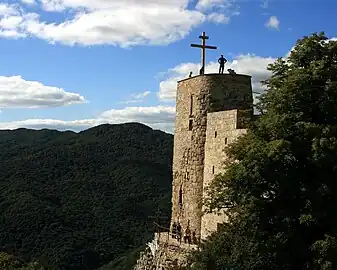 St. Anton's Tower, Martqopi Monastery, Georgia.
St. Anton's Tower, Martqopi Monastery, Georgia.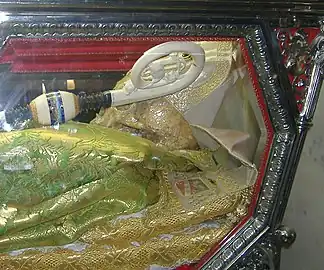 Relics of St Bassian of Lodi, in Lodi's Cathedral Crypt, Italy.
Relics of St Bassian of Lodi, in Lodi's Cathedral Crypt, Italy.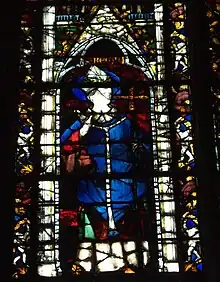 Saint Remigius of Rouen
Saint Remigius of Rouen
(Stained glass, Cathedral of Notre-Dame in Rouen)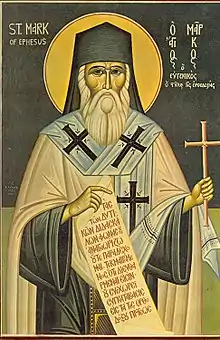
Notes
- The notation Old Style or (OS) is sometimes used to indicate a date in the Julian Calendar (which is used by churches on the "Old Calendar").
The notation New Style or (NS), indicates a date in the Revised Julian calendar (which is used by churches on the "New Calendar"). - The memory of Saint Theodotos, who hailed from Cyprus and lived during the time of Emperor Licinius (307-323 AD), is recorded in the Synaxaristes and in the Menaia on two occasions: on the 19th or 17th of January, the day of his release from prison; and on March 2, the day of his repose. The saint was persecuted and suffered much for his faith in Christ. He reposed peacefully however, likely in the period of Constantine the Great.
- "At Spoleto, in the days of the emperor Antoninus, the passion of St. Pontian, martyr, who was barbarously scourged for Christ by the command of the judge Fabian, and then compelled to walk barefoot on burning coals. As he was uninjured by the tire, he was put on the rack, was torn with iron hooks, and then thrown into a dungeon, where he was comforted by the visit of an angel. He was afterwards exposed to the lions, had melted lead poured over him and finally died by the sword."[14]
- A holy virgin in Foligno in Italy. She visited Bishop Felician of Foligno in prison, was denounced as a Christian and clubbed to death.
- Marius, a Persian nobleman, his wife Martha, and their two sons, Audifax and Abachum, travelled to Rome to venerate the tombs of the Apostles. While there, they also buried the bodies of those being martyred in the persecution of Claudius II. They too were arrested, the three men beheaded and St Martha drowned.
- "AT Rome, on the Cornelian road, the holy martyrs Marius and his wife Martha, with their sons Audifax and Abachum, noble Persians, who came to Rome, through devotion, in the time of the Emperor Claudius. After they had been beaten with rods, tortured on the rack and with fire, lacerated with iron hooks, and had endured the cutting off of their hands, Martha was put to death in the place called Nympha, The others were beheaded and cast into the flames."[14]
- Born in Sicily, he became Bishop of Lodi in Lombardy in Italy. He was much esteemed by St Ambrose of Milan, with whom he attended the Council of Aquilia (381) and at whose repose he was present (390).
- A shepherd boy near Chartres in France and then priest, he became a hermit. Disciples came and he founded the monastery of Corbion near Chartres. He lived to be over a hundred.
- King Athelstan, who founded the monastery of Milton in Dorset in England translated relics of the saint there in 935 AD:
- "When King Athelstan had founded the Abbey of Middleton, he was careful to enrich the church with many precious relics, which he collected from various parts of the world from Rome, from the Continental Brittany, and many other places. Among these sacred treasures was an arm of ST. BRANWALLATOR, Bishop, whose name was associated with those of our Blessed Lady, St. Michael, and St. Samson, in the dedication of the church. Who St. Branwallator was, we have no information; but from his name, it may be inferred that he was a Briton, whether a native of this island or of the Continent."[16]
- Born of a wealthy family in Scotland, he became a hermit and was praised for earning his living by tilling the soil, 'which comes closest to divine contemplation'. He became a bishop and lived in Tullicht.
- See also: (in Russian) Скипетров, Пётр Иванович. Russian Wikipedia.
References
- January 19 / February 1. Orthodox Calendar (PRAVOSLAVIE.RU).
- Great Synaxaristes: (in Greek) Ἡ Ἁγία Εὐφρασία ἡ Μάρτυς. 19 Ιανουαρίου. ΜΕΓΑΣ ΣΥΝΑΞΑΡΙΣΤΗΣ.
- Virginmartyr Euphrasia of Nicomedia. OCA - Lives of the Saints.
- Great Synaxaristes: (in Greek) Ὁ Ἅγιος Θεόδοτος Ἐπίσκοπος Κυρήνειας. 19 Ιανουαρίου. ΜΕΓΑΣ ΣΥΝΑΞΑΡΙΣΤΗΣ.
- Great Synaxaristes: (in Greek) Ὁ Ὅσιος Μακάριος ὁ Αἰγύπτιος ὁ Ἀναχωρητὴς. 19 Ιανουαρίου. ΜΕΓΑΣ ΣΥΝΑΞΑΡΙΣΤΗΣ.
- Venerable Macarius the Great of Egypt. OCA - Lives of the Saints.
- Great Synaxaristes: (in Greek) Ὁ Ὅσιος Μακάριος ὁ Ἀλεξανδρεύς. 19 Ιανουαρίου. ΜΕΓΑΣ ΣΥΝΑΞΑΡΙΣΤΗΣ.
- Venerable Macarius of Alexandria. OCA - Lives of the Saints.
- Great Synaxaristes: (in Greek) Ὁ Ὅσιος Μακάριος Ἐπίσκοπος Ἱερισσοῦ. 19 Ιανουαρίου. ΜΕΓΑΣ ΣΥΝΑΞΑΡΙΣΤΗΣ.
- Venerable Anton the Stylite of Martqophi. HOLY TRINITY RUSSIAN ORTHODOX CHURCH (A parish of the Patriarchate of Moscow).
- Great Synaxaristes: (in Greek) Ὁ Ἅγιος Ἀρσένιος Ἀρχιεπίσκοπος Κερκύρας. 19 Ιανουαρίου. ΜΕΓΑΣ ΣΥΝΑΞΑΡΙΣΤΗΣ.
- St Arsenius the Archbishop of Kerkyra (Corfu). OCA - Lives of the Saints.
- January 19. Latin Saints of the Orthodox Patriarchate of Rome.
- The Roman Martyrology. Transl. by the Archbishop of Baltimore. Last Edition, According to the Copy Printed at Rome in 1914. Revised Edition, with the Imprimatur of His Eminence Cardinal Gibbons. Baltimore: John Murphy Company, 1916. pp.19-20.
- Great Synaxaristes: (in Greek) Οἱ Ἅγιοι Παῦλος, Γερόντιος, Ἰανουάριος, Σατουρνῖνος, Σακκέσιος, Ἰούλιος, Κάτιος, Πῖος καὶ Γερμανὸς οἱ Μάρτυρες. 19 Ιανουαρίου. ΜΕΓΑΣ ΣΥΝΑΞΑΡΙΣΤΗΣ.
- Rev. Richard Stanton. A Menology of England and Wales, or, Brief Memorials of the Ancient British and English Saints Arranged According to the Calendar, Together with the Martyrs of the 16th and 17th Centuries. London: Burns & Oates, 1892. p.25.
- Great Synaxaristes: (in Greek) Ὁ Ὅσιος Κοσμᾶς ὁ Χρυσοστόματος. 19 Ιανουαρίου. ΜΕΓΑΣ ΣΥΝΑΞΑΡΙΣΤΗΣ.
- Great Synaxaristes: (in Greek) Ὁ Ὅσιος Μακάριος ὁ Νηστευτὴς ἐκ Ρωσίας. 19 Ιανουαρίου. ΜΕΓΑΣ ΣΥΝΑΞΑΡΙΣΤΗΣ.
- Venerable Macarius the Faster, of the Kiev Near Caves. OCA - Lives of the Saints.
- Great Synaxaristes: (in Greek) Ὁ Ὅσιος Μελέτιος ὁ Ὁμολογητής ὁ Γαλησιώτης. 19 Ιανουαρίου. ΜΕΓΑΣ ΣΥΝΑΞΑΡΙΣΤΗΣ.
- Great Synaxaristes: (in Greek) Ὁ Ὅσιος Μακάριος ὁ Διάκονος ἐκ Ρωσίας. 19 Ιανουαρίου. ΜΕΓΑΣ ΣΥΝΑΞΑΡΙΣΤΗΣ.
- Venerable Macarius the Deacon of the Kiev Caves. OCA - Lives of the Saints.
- Great Synaxaristes: (in Greek) Ὁ Ἅγιος Θεόδωρος ὁ διὰ Χριστὸν Σαλός τοῦ Νόβγκοροντ. 19 Ιανουαρίου. ΜΕΓΑΣ ΣΥΝΑΞΑΡΙΣΤΗΣ.
- Righteous Theodore of Novgorod the Fool-For-Christ. OCA - Lives of the Saints.
- Great Synaxaristes: (in Greek) Ὁ Ἅγιος Μᾶρκος ὁ Εὐγενικὸς Ἐπίσκοπος Ἐφέσου. 19 Ιανουαρίου. ΜΕΓΑΣ ΣΥΝΑΞΑΡΙΣΤΗΣ.
- St Mark the Archbishop of Ephesus. OCA - Lives of the Saints.
- The Autonomous Orthodox Metropolia of Western Europe and the Americas (ROCOR). St. Hilarion Calendar of Saints for the year of our Lord 2004. St. Hilarion Press (Austin, TX). pp.8-9.
- Great Synaxaristes: (in Greek) Ὁ Ὅσιος Μακάριος ὁ Ρωμαῖος. 19 Ιανουαρίου. ΜΕΓΑΣ ΣΥΝΑΞΑΡΙΣΤΗΣ.
- Venerable Macarius the Roman of Novgorod. OCA - Lives of the Saints.
- February 1 / January 19. HOLY TRINITY RUSSIAN ORTHODOX CHURCH (A parish of the Patriarchate of Moscow).
- (in Russian) 19 января (ст.ст.) 1 февраля 2013 (нов. ст.). Русская Православная Церковь Отдел внешних церковных связей. (DECR).
- Great Synaxaristes: (in Greek) Μνήμη Θαύματος Μεγάλου Βασιλείου. 19 Ιανουαρίου. ΜΕΓΑΣ ΣΥΝΑΞΑΡΙΣΤΗΣ.
- Great Synaxaristes: (in Greek) Ἀνακομιδὴ Τιμίων Λειψάνων Ἁγίου Γρηγορίου Θεολόγου. 19 Ιανουαρίου. ΜΕΓΑΣ ΣΥΝΑΞΑΡΙΣΤΗΣ.
- Opening of the Relics of the Venerable Sava of Storozhev, or Zvenigorod. OCA - Lives of the Saints.
Sources
- January 19 / February 1. Orthodox Calendar (PRAVOSLAVIE.RU).
- February 1 / January 19. HOLY TRINITY RUSSIAN ORTHODOX CHURCH (A parish of the Patriarchate of Moscow).
- January 19. OCA - The Lives of the Saints.
- The Autonomous Orthodox Metropolia of Western Europe and the Americas (ROCOR). St. Hilarion Calendar of Saints for the year of our Lord 2004. St. Hilarion Press (Austin, TX). pp. 8–9.
- January 19. Latin Saints of the Orthodox Patriarchate of Rome.
- The Roman Martyrology. Transl. by the Archbishop of Baltimore. Last Edition, According to the Copy Printed at Rome in 1914. Revised Edition, with the Imprimatur of His Eminence Cardinal Gibbons. Baltimore: John Murphy Company, 1916. pp. 19–20.
- Rev. Richard Stanton. A Menology of England and Wales, or, Brief Memorials of the Ancient British and English Saints Arranged According to the Calendar, Together with the Martyrs of the 16th and 17th Centuries. London: Burns & Oates, 1892. p. 25.
Greek Sources
- Great Synaxaristes: (in Greek) 19 ΙΑΝΟΥΑΡΙΟΥ. ΜΕΓΑΣ ΣΥΝΑΞΑΡΙΣΤΗΣ.
- (in Greek) Συναξαριστής. 19 Ιανουαρίου. ECCLESIA.GR. (H ΕΚΚΛΗΣΙΑ ΤΗΣ ΕΛΛΑΔΟΣ).
Russian Sources
- (in Russian) 1 февраля (19 января). Православная Энциклопедия под редакцией Патриарха Московского и всея Руси Кирилла (электронная версия). (Orthodox Encyclopedia - Pravenc.ru).
- (in Russian) 19 января (ст.ст.) 1 февраля 2013 (нов. ст.). Русская Православная Церковь Отдел внешних церковных связей. (DECR).
This article is issued from Wikipedia. The text is licensed under Creative Commons - Attribution - Sharealike. Additional terms may apply for the media files.

